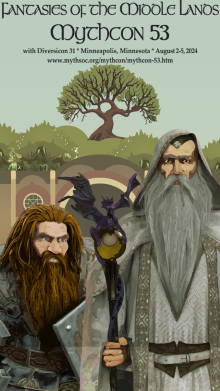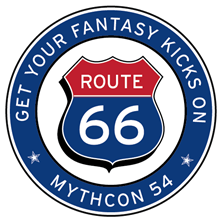Location
Minneapolis, Minnesota
Document Type
Presentation
Event Website
https://www.mythsoc.org/mythcon/mythcon-53.htm
Start Date
4-8-2024 4:30 PM
End Date
4-8-2024 5:20 PM
Description
In spite of its relative brevity, J.R.R. Tolkien’s Smith of Wootton Major has been a subject of numerous interpretations, with different scholars diverging on whether and to what extent the story can be read as allegorical, autobiographical, philosophical and religious (cf. esp. Flieger & Shippey 2001). In my presentation, I want to focus on an overlooked theme of the story: the way in which reaching or crossing the boundaries of the realm of Faery – the ‘Perilous Realm’ (OFS 32) of Tolkien’s literary aesthetics – results in borderline cognitive states like inquiry, hesitance and doubt. Though Wootton Major – unlike the towns from Hope Mirrlees’s Lud-in-the-Mist or Neil Gaiman’s Stardust – is not in the geographical neighborhood of Faery, it lies on Faery’s border ontologically. Just like in George MacDonald’s The Golden Key, which inspired Tolkien to write Smith, Faery is ‘the country whence the shadows fall’ (MacDonald 1980, 35) on the everyday reality of the inhabitants of the village; this gets reflected in their lives as a pervading sense of mystery, so that both the characters and the reader keep wondering, hesitating,
inquiring, doubting and seeking. Since the small world of Smith of Wootton Major in many ways serves as a microcosm of Tolkien’s larger literary universes (cf. Long 2014), taking a look at this theme through the lens of the epistemology of questions (cf. e.g. Salmon 1995) can throw light on Tolkien’s other works, with Smith and his fellow countrymen akin to other characters placed ‘at once in both worlds’ (LotR 223) – like the Men of Twilight or Eärendil, literally, physically suspended between the mortal and immortal realm. I argue that Smith’s struggles and doubts which result from living ‘both in the world and in Faery’ (Smith 44) introduce to Tolkien’s Platonic literary vision an element of imaginative agnosticism going further than just ‘willing suspension of disbelief’ (OFS 52, cf. Coleridge 2014, 208), disclosing a theme whose presence in Tolkien’s writings has rarely been acknowledged: the positive role of not knowing – especially in connection to the power and significance of hope.
Creative Commons License

This work is licensed under a Creative Commons Attribution-NonCommercial-No Derivative Works 4.0 International License.
Included in
“Blindfolded by mist or by shadow’: Seeking, hesitating and doubting in Tolkien’s Smith of Wootton Major
Minneapolis, Minnesota
In spite of its relative brevity, J.R.R. Tolkien’s Smith of Wootton Major has been a subject of numerous interpretations, with different scholars diverging on whether and to what extent the story can be read as allegorical, autobiographical, philosophical and religious (cf. esp. Flieger & Shippey 2001). In my presentation, I want to focus on an overlooked theme of the story: the way in which reaching or crossing the boundaries of the realm of Faery – the ‘Perilous Realm’ (OFS 32) of Tolkien’s literary aesthetics – results in borderline cognitive states like inquiry, hesitance and doubt. Though Wootton Major – unlike the towns from Hope Mirrlees’s Lud-in-the-Mist or Neil Gaiman’s Stardust – is not in the geographical neighborhood of Faery, it lies on Faery’s border ontologically. Just like in George MacDonald’s The Golden Key, which inspired Tolkien to write Smith, Faery is ‘the country whence the shadows fall’ (MacDonald 1980, 35) on the everyday reality of the inhabitants of the village; this gets reflected in their lives as a pervading sense of mystery, so that both the characters and the reader keep wondering, hesitating,
inquiring, doubting and seeking. Since the small world of Smith of Wootton Major in many ways serves as a microcosm of Tolkien’s larger literary universes (cf. Long 2014), taking a look at this theme through the lens of the epistemology of questions (cf. e.g. Salmon 1995) can throw light on Tolkien’s other works, with Smith and his fellow countrymen akin to other characters placed ‘at once in both worlds’ (LotR 223) – like the Men of Twilight or Eärendil, literally, physically suspended between the mortal and immortal realm. I argue that Smith’s struggles and doubts which result from living ‘both in the world and in Faery’ (Smith 44) introduce to Tolkien’s Platonic literary vision an element of imaginative agnosticism going further than just ‘willing suspension of disbelief’ (OFS 52, cf. Coleridge 2014, 208), disclosing a theme whose presence in Tolkien’s writings has rarely been acknowledged: the positive role of not knowing – especially in connection to the power and significance of hope.
https://dc.swosu.edu/mythcon/mc53/schedule/61


